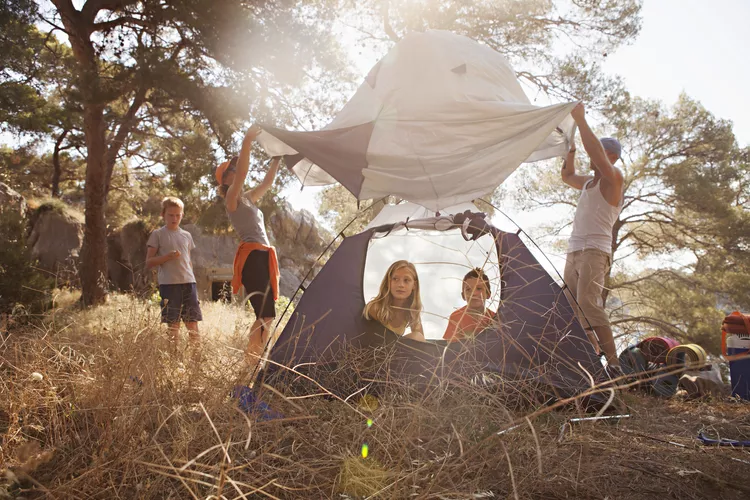How to Set Up Camp and Pitch a Tent
As you approach the campground entrance, the excitement begins and your heart beats a little faster. Don’t get too excited yet; there’s still the matter of checking in, picking out a site, and setting up camp. You might think that pitching a tent is the most crucial part of setting up your campsite, and it is important. However, there are plenty of factors to consider when camping.
Checking In
When you first arrive at the campground, you’ll want to stop at the campground office and check in. Identify yourself to the campground hosts and indicate whether you have a reservation or not. They will have you fill out a registration form and state the number of campers, how long you intend to stay, and whether you’re tent camping or RVing. While registering, ask to drive through the campground to pick out a site. Inform them that this is your first time here and you want to see what’s available. The office may have a map so that you can see the different areas of the campground. If you have any location preferences, such as being close to the bathroom and showers, next to the lake, or away from RVs, don’t hesitate to ask the attendants. This is also a good opportunity to ask questions about campground rules, quiet hours, garbage disposal areas, emergency contacts, and ranger patrols, which is good to know if you’re camping alone.
Preparing Your Campsite and Pitch Your Tent
You’ve finally arrived at the campground, and you’re scoping out the area to determine which spot looks best for your campsite setup. What should you be looking for?
- Look for relatively high, level ground: There is some truth to the saying “high and dry.” Select a spot to set up your tent that is elevated above the surrounding ground. In a storm, rain will flow away from your tent rather than underneath it. Avoid setting up your tent on a slope to prevent rolling out of your sleeping bag all night.
- Check for a water source nearby: Water is essential for camping. You’ll need it for drinking, cooking, and cleaning. When choosing a campsite, consider how far it is to the nearest water source to avoid making long trips with heavy containers.
- Find an adequate area for cooking: Never cook inside your tent. Most campsites have a grill and picnic table. Locate a flat cooking area away from any leaves, twigs, or brush that may catch fire. Always supervise a campfire to prevent accidents.
- Pick another area for cleaning: Campgrounds usually have cleaning stations and water faucets. Avoid using bathrooms or drinking fountains for washing dishes, as hot, soapy water can harm the environment. Use biodegradable soap and dispose of gray water only in designated areas.
- Find the garbage cans: Keeping a clean campsite is paramount. Collect all litter and place it away from your tent, out of reach of local wildlife. It’s wise to bring plenty of plastic garbage bags and change them daily.
- Pick a campsite with some shade: A shady spot can be refreshing during hot days. However, avoid setting your tent up under trees during rainy weather, as it increases the risk of falling branches and leaks.
Time for Recreation
After setting up the campsite, it’s time to enjoy the outdoor activities you came for. Now is the moment to engage in whatever activities you love. For many campers, seeing the campsite organized and experiencing the fresh air serves as a revitalizing change from urban life. Take this time to sit down, hydrate, and relax. It’s during this period that the realization often hits—“What did I forget to bring?” Chances are, there’s always something you might need that was left behind.
More Campsite Tips
- Keep a checklist: Itemize your gear and essentials necessary for camping. Your list may vary based on your preferences and locations, but regularly using it is crucial.
- Plan meal times: Whether there are two or more of you, communicate meal times to avoid everyone scattering to play. Preparing meals at the campground takes time, but it often becomes a fun group activity.
- Maintain a clean campsite: After meals, thoroughly clean up the dishes and dining area. Dispose of all trash properly, as forgetting food can lead to unwanted wildlife encounters.
- Observe campground rules: Campground rules are established for everyone’s enjoyment. It only takes one disruptive camper to spoil things for others—be a considerate neighbor.
- Take a late-night walk: Enjoy the stars, listen to the serene surroundings, and breathe in the fresh air. Such moments in nature are truly rewarding.
Now, settle in and get a good night’s sleep!





